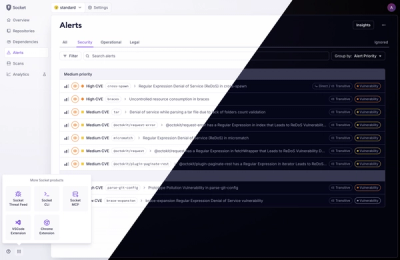
Product
A Fresh Look for the Socket Dashboard
We’ve redesigned the Socket dashboard with simpler navigation, less visual clutter, and a cleaner UI that highlights what really matters.
A test framework extending unittest, providing flexible test suites config, concurrent execution, Html/XUnit reports, and data driven utility.
unishark extends unittest (to be accurate, unittest2) in the following ways:
For existing unittests, the first three features could be obtained immediately with a single config, without changing any test code.
Here is an example config in YAML format (you could also write it directly in a dict()):
.. code:: yaml
suites:
my_suite_name_1:
package: my.package.name
groups:
my_group_1:
granularity: module
modules: [test_module1, test_module2]
except_classes: [test_module2.MyTestClass3]
except_methods: [test_module1.MyTestClass1.test_1]
my_group_2:
granularity: class
disable: False
classes: [test_module3.MyTestClass5]
except_methods: [test_module3.MyTestClass5.test_11]
concurrency:
level: module
max_workers: 2
my_suite_name_2:
package: my.package.name
groups:
my_group_1:
granularity: method
methods: [test_module3.MyTestClass6.test_13, test_module3.MyTestClass7.test_15]
concurrency:
level: class
max_workers: 2
my_suite_name_3:
package: another.package.name
groups:
group_1:
granularity: package
pattern: '(\w+\.){2}test\w*'
except_modules: [module1, module2]
except_classes: [module3.Class1, module3.Class3]
except_methods: [module3.Class2.test_1, module4.Class2.test_5]
concurrency:
level: method
max_workers: 20
reporters:
html:
class: unishark.HtmlReporter
kwargs:
dest: logs
overview_title: 'Example Report'
overview_description: 'This is an example report'
xunit:
class: unishark.XUnitReporter
kwargs:
summary_title: 'Example Report'
test:
suites: [my_suite_name_1, my_suite_name_2, my_suite_name_3]
concurrency:
type: processes
max_workers: 3
reporters: [html, xunit]
name_pattern: '^test\w*'
It configures 3 test suites with some of the test cases excluded, and running the defined set of tests concurrently, and generating both HTML and XUnit (default JUnit) format reports at the end of tests.
NOTE: In 0.2.x versions, 'max_workers' was set directly under 'test', and 'max_workers' and 'concurrency_level' were set directly under '{suite name}'.
To run it, simply add the following code:
.. code:: python
import unishark
import yaml
if __name__ == '__main__':
with open('your_yaml_config_file', 'r') as f:
dict_conf = yaml.load(f.read()) # use a 3rd party yaml parser, e.g., PyYAML
program = unishark.DefaultTestProgram(dict_conf)
unishark.main(program)
A HTML report example can be found Here_.
.. _Here: https://github.com/twitter/unishark
Here are some effects of using @unishark.data_driven.
‘Json’ style data-driven:
.. code:: python
@unishark.data_driven(*[{'userid': 1, 'passwd': 'abc'}, {'userid': 2, 'passwd': 'def'}])
def test_data_driven(self, **param):
print('userid: %d, passwd: %s' % (param['userid'], param['passwd']))
Results:
::
userid: 1, passwd: abc
userid: 2, passwd: def
‘Args’ style data-driven:
.. code:: python
@unishark.data_driven(userid=[1, 2, 3, 4], passwd=['a', 'b', 'c', 'd'])
def test_data_driven(self, **param):
print('userid: %d, passwd: %s' % (param['userid'], param['passwd']))
Results:
::
userid: 1, passwd: a
userid: 2, passwd: b
userid: 3, passwd: c
userid: 4, passwd: d
Cross-multiply data-driven:
.. code:: python
@unishark.data_driven(left=list(range(10)))
@unishark.data_driven(right=list(range(10)))
def test_data_driven(self, **param):
l = param['left']
r = param['right']
print('%d x %d = %d' % (l, r, l * r))
Results:
::
0 x 1 = 0
0 x 2 = 0
...
1 x 0 = 0
1 x 1 = 1
1 x 2 = 2
...
...
9 x 8 = 72
9 x 9 = 81
You can get the permutations (with repetition) of the parameters values by doing:
.. code:: python
@unishark.data_driven(...)
@unishark.data_driven(...)
@unishark.data_driven(...)
...
Multi-threads data-driven in 'json style':
.. code:: python
@unishark.multi_threading_data_driven(2, *[{'userid': 1, 'passwd': 'abc'}, {'userid': 2, 'passwd': 'def'}])
def test_data_driven(self, **param):
print('userid: %d, passwd: %s' % (param['userid'], param['passwd']))
Results: same results as using unishark.data_driven, but up to 2 threads are spawned, each running the test with a set of inputs (userid, passwd).
Multi-threads data-driven in 'args style':
.. code:: python
@unishark.multi_threading_data_driven(5, time=[1, 1, 1, 1, 1, 1, 1, 1, 1, 1])
def test_data_driven(self, **param):
sleep(param['time'])
Results: 5 threads are spawned to run the test with 10 sets of inputs concurrently (only sleep 1 sec in each thread). It takes about 2 sec in total (10 sec if using unishark.data_driven) to run.
For more information please visit the Project_Home_ and read README.md.
.. _Project_Home: https://github.com/twitter/unishark
support running tests in parallel.
support configuring test suites, test reporters and concurrent tests in a single dict/yaml config.
improve HtmlReporter and XUnitReporter classes to be thread-safe.
allow user to generate reports with their own report templates.
allow user to filter loaded test cases by setting method name prefix in the test config.
bugs fix.
improve documentation.
hotfix for setup.py (broken auto-downloading dependencies)
bugs fix.
support loading customized test suites.
support a thread-safe string io buffer to buffer logging stream during the test running.
support writing logs, exceptions into generated HTML/XUnit reports.
offer a data-driven decorator.
initial setup (documentation, setup.py, travis CI, coveralls, etc.).
FAQs
A test framework extending unittest, providing flexible test suites config, concurrent execution, Html/XUnit reports, and data driven utility.
We found that unishark demonstrated a healthy version release cadence and project activity because the last version was released less than a year ago. It has 1 open source maintainer collaborating on the project.
Did you know?

Socket for GitHub automatically highlights issues in each pull request and monitors the health of all your open source dependencies. Discover the contents of your packages and block harmful activity before you install or update your dependencies.

Product
We’ve redesigned the Socket dashboard with simpler navigation, less visual clutter, and a cleaner UI that highlights what really matters.

Industry Insights
Terry O’Daniel, Head of Security at Amplitude, shares insights on building high-impact security teams, aligning with engineering, and why AI gives defenders a fighting chance.

Security News
MCP spec updated with structured tool output, stronger OAuth 2.1 security, resource indicators, and protocol cleanups for safer, more reliable AI workflows.